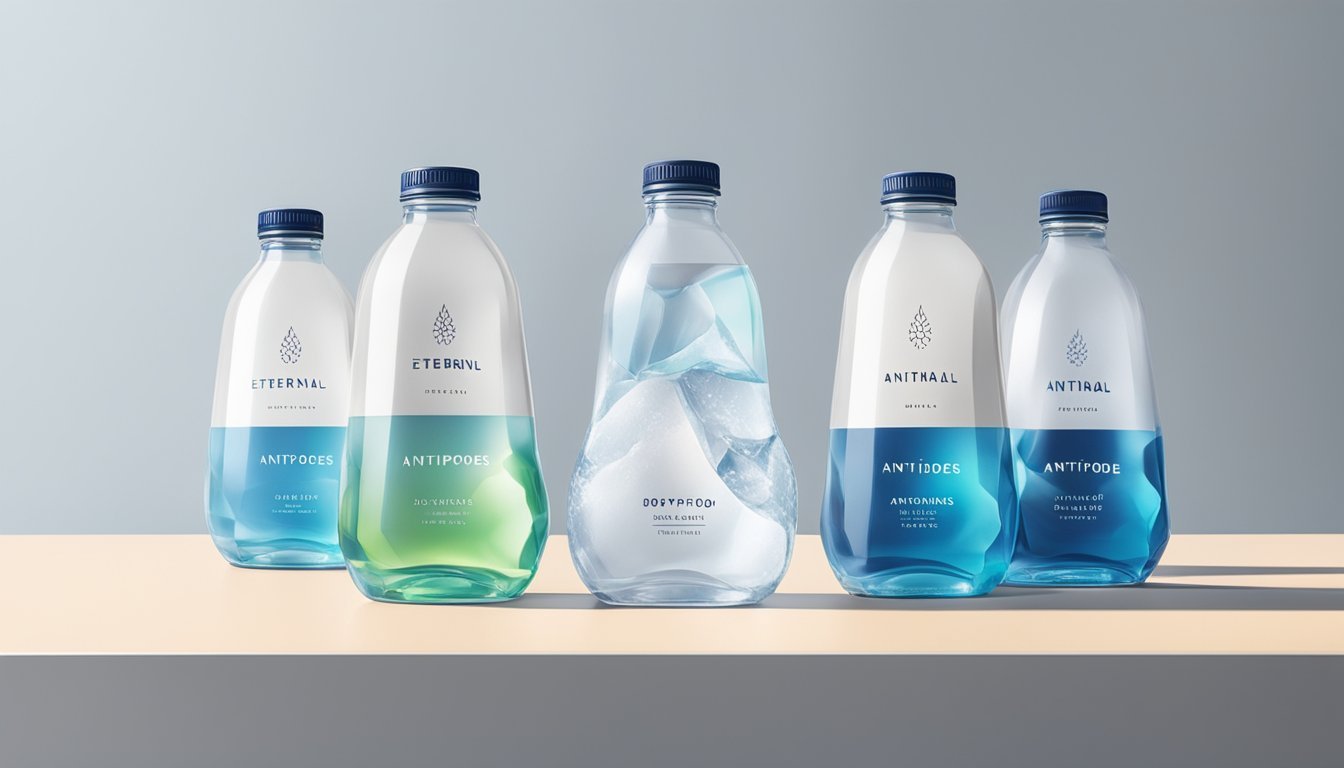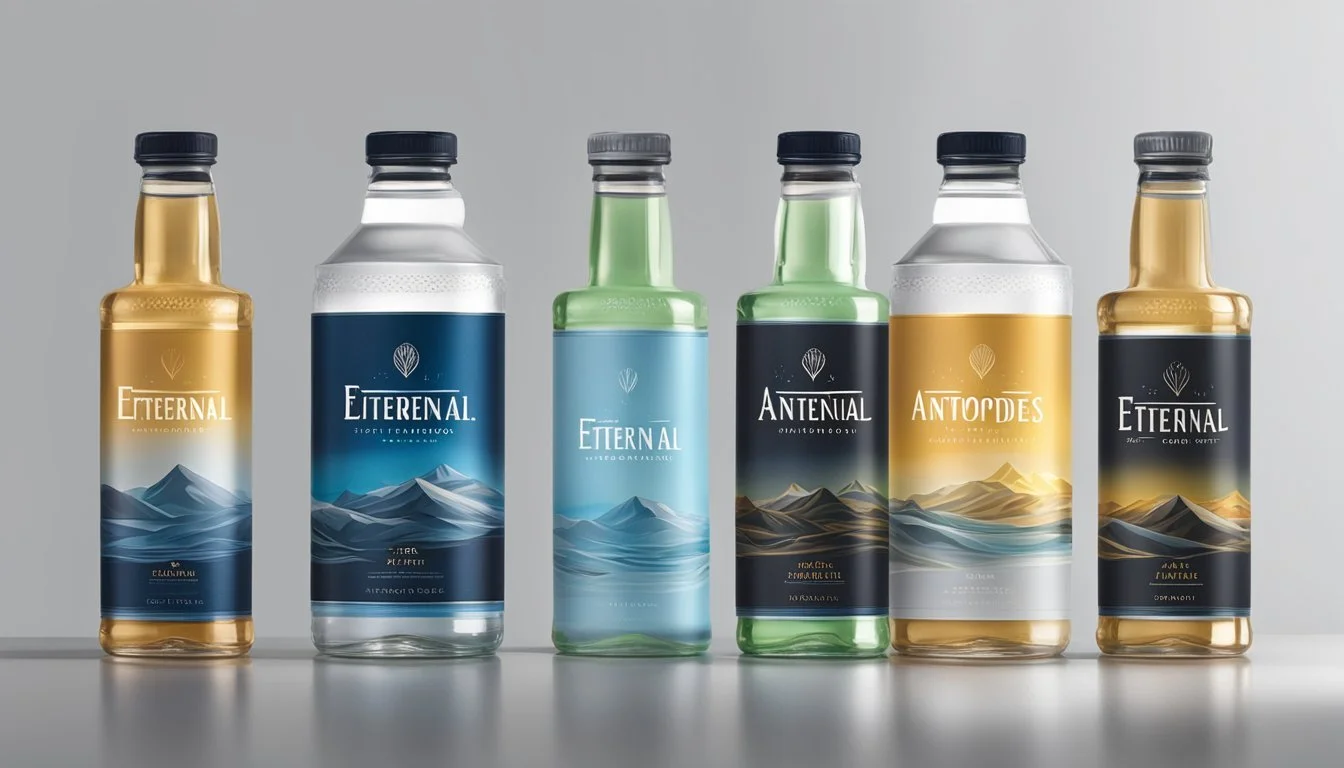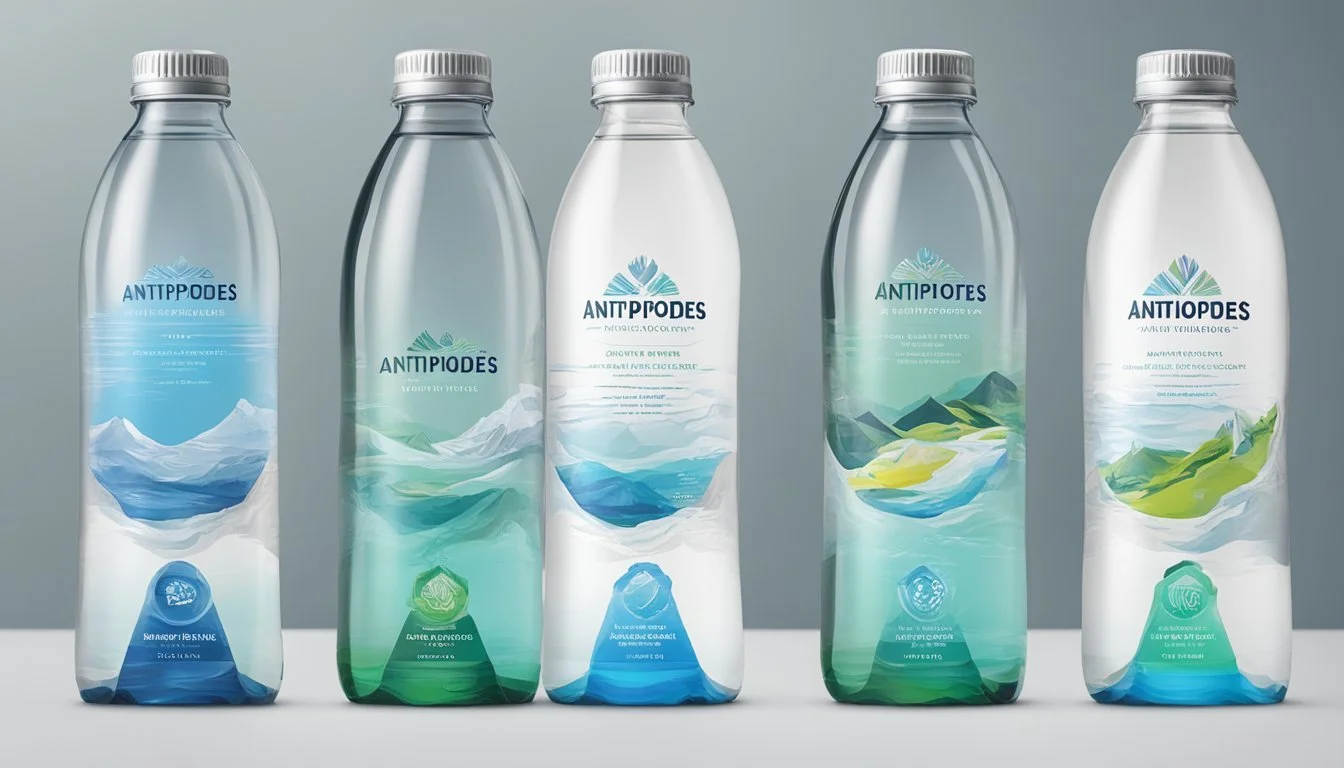Eternal vs. Antipodes
Comparing Quality and Taste
Choosing the right bottled water can be as refreshing as it is essential for maintaining proper hydration. Eternal and Antipodes offer premium options, but which one is truly better? Eternal Water, with its perfect blend of purity and electrolytes, stands out as a convenient go-to choice for those seeking reliable hydration on the go.
Eternal's appeal lies in its consistent quality and the convenience of its packaging, making it ideal for everyday use. On the other hand, Antipodes is celebrated for its exceptionally clean and refreshing taste, sourced from New Zealand's pristine aquifers. Both brands bring something unique to the table, making the decision not just about taste but overall experience.
For those who prioritize a natural, unadulterated taste, Antipodes delivers a premium experience that resonates with water connoisseurs. Determining the better choice between Eternal and Antipodes ultimately depends on what the consumer values more: the convenience and consistent quality of Eternal or the pristine, natural taste of Antipodes.
Overview of Eternal and Antipodes
Eternal and Antipodes are two prominent bottled water brands known for their high-quality offerings. This section will explore the histories, origins, processing techniques, and environmental commitments of these two brands.
Brand Histories
Eternal Water began as a niche brand focusing on providing naturally alkaline water. The brand has gained popularity due to its naturally high pH level and commitment to purity. Antipodes, founded in New Zealand, has established itself as a premium water brand, known for its minimalist design and high quality.
Both brands have carved out loyal followings, with Eternal appealing to health enthusiasts and Antipodes attracting those with a taste for luxury. Their distinct market positions have allowed them to thrive in a competitive industry.
Source and Origin
Eternal sources its water from natural springs located in pristine regions of the United States. These springs are carefully chosen for their naturally high pH levels and mineral content. The water undergoes minimal processing to maintain its original quality.
Antipodes sources its water from an aquifer in the Bay of Plenty, New Zealand. The region is known for its unspoiled environment, providing water of exceptional purity. The aquifer is replenished naturally, ensuring a sustainable supply without over-extraction.
Water Processing Techniques
Eternal's water is bottled at the source. The natural alkalinity is preserved through minimal processing, which includes micro-filtration to remove impurities without altering the water's composition. The brand emphasizes maintaining the water's natural state while ensuring safety.
Antipodes uses a different approach, focusing on artisan techniques. The water is filtered and bottled in a state-of-the-art facility designed to ensure the highest hygiene standards. The process preserves the natural minerals and characteristics of the water, aligning with their premium branding.
Environmental Responsibility and Sustainability
Eternal Water shows a commitment to sustainability through the use of recyclable packaging and efforts to reduce its carbon footprint. The brand engages in practices that protect the natural springs and surrounding ecosystems, ensuring long-term sustainability.
Antipodes has a robust sustainability model. The brand uses lightweight, recycled glass bottles, significantly reducing plastic waste. Antipodes is also carbon-neutral, purchasing carbon credits to offset their emissions and engaging in reforestation projects to support environmental health.
Both brands place a high value on environmental responsibility, taking steps to minimize their impact on the planet. Their efforts reflect a growing consumer demand for eco-friendly products and practices in the bottled water industry.
Chemical and Physical Properties of Water
Understanding the chemical and physical properties of water is essential when comparing bottled water brands such as Eternal and Antipodes. These properties impact the taste, health benefits, and overall quality of the water.
pH Level and Alkalinity
pH levels indicate how acidic or alkaline a substance is. Alkaline water typically has a pH level above 7, and many consumers prefer it for potential health benefits.
Eternal Water has a naturally high pH level, often around 8. Eternal Water's alkalinity is achieved through natural processes as it filters through layers of volcanic rock.
Antipodes also boasts a high pH level, often around 7.8-8.2. This makes both brands highly alkaline, though their methods of attaining this alkalinity differ.
Mineral Content
Mineral content is crucial as it affects both taste and health benefits.
Eternal Water contains essential minerals like calcium, magnesium, and potassium. These are naturally absorbed as the water flows through rich underground sources.
Antipodes features a similar mineral profile, also boasting rich concentrations of magnesium and calcium.
A table comparing these mineral contents can look like this:
Mineral Eternal Water (mg/L) Antipodes (mg/L) Calcium 20 22 Magnesium 15 16 Potassium 3 4
Hydration and Health Benefits
Both Eternal and Antipodes excel in providing hydration and health benefits. The naturally occurring minerals such as calcium and magnesium are crucial for bone health and muscle function.
Eternal Water offers electrolytes that aid in quick hydration, making it suitable for athletes and those requiring rapid fluid replenishment.
Antipodes water's balanced mineral content makes it ideal for daily consumption, ensuring consistent hydration and potential long-term health benefits.
Taste Profile
Eternal and Antipodes are renowned for their distinct taste profiles, influenced by their mineral content and natural filtration processes. This section explores how these factors come into play.
Understanding Taste Preferences
Taste preferences vary greatly among individuals. Some people prefer a crisp, clean taste that feels refreshing, while others might lean towards a richer, more mineral-heavy profile.
Eternal water has a smooth and crisp taste due to its naturally alkaline pH level of 7.8-8.2. By contrast, Antipodes, sourced from deeply buried aquifers, offers a soft yet slightly sweet taste, resulting from its unique mineral makeup.
The Role of Minerals in Taste
Minerals play a crucial role in the taste of bottled water. Calcium and magnesium often contribute to a water’s smoothness and can leave a pleasant mouthfeel.
In Eternal, the journey through ancient rocks adds essential minerals such as calcium and magnesium. These contribute to its refreshing qualities and clean aftertaste.
Antipodes also benefits from a similar natural filtration, resulting in slight variations in taste due to minerals like sodium and silica, enhancing its soft and slightly sweet profile.
Comparing Eternal and Antipodes Taste
When comparing Eternal and Antipodes, it's essential to consider mineral content and pH balance. Eternal’s naturally alkaline pH provides a crisp and smooth experience, perfect for those seeking a refreshing drink.
Antipodes, with its more complex mineral composition, offers a softer, slightly sweet taste. This appeals to those who enjoy a water that feels smooth and somewhat silky.
Personal taste preferences will ultimately decide which brand is preferred. Eternal’s crispness might attract those preferring a refreshing and clean option, whereas Antipodes’s smoothness could appeal to those seeking a more nuanced taste experience.
Health and Nutritional Insights
Exploring the health benefits and nutritional value of bottled water like Eternal and Antipodes is essential for making an informed choice. Each brand offers unique qualities that might affect bone health, digestion, and overall well-being.
Nutrients in Bottled Water
Both Eternal and Antipode alkaline waters are known for their minerals. Eternal water contains naturally occurring electrolytes, such as magnesium, calcium, and potassium, which are essential for bodily functions. Antipodes also boasts a balanced mineral content, including high levels of silica, which can benefit skin health.
Nutrient Eternal Water (mg/L) Antipodes (mg/L) Magnesium 5.4 6.0 Calcium 30.0 28.9 Potassium 2.1 1.2 Silica 7.3 27.0
Bottled Water and Bone Health
Calcium and magnesium play vital roles in bone health. Eternal provides a moderate amount of calcium, supporting bone density and strength. Antipodes, on the other hand, is slightly lower in calcium but contains beneficial silica. Silica helps in the formation of collagen, an important part of the bone matrix. Consuming water rich in these minerals can contribute to maintaining strong and healthy bones.
Impact on Digestion and Well-Being
Staying hydrated is crucial for digestion and overall well-being. Alkaline water, like Eternal and Antipodes, may help neutralize stomach acid, potentially alleviating acid reflux symptoms. Furthermore, the electrolytes in Eternal assist in maintaining fluid balance, while the high silica content in Antipodes could support overall digestive health by promoting smooth intestinal function. In essence, these bottled waters not only hydrate but may also contribute to a healthier digestive system.
Packaging and Accessibility
The packaging and accessibility of bottled water play a crucial role in consumer choice and environmental impact. This section compares the bottle materials, their recyclability, and the efforts made by Eternal and Antipodes to enhance availability and convenience.
Types of Bottles and Environmental Impact
Eternal and Antipodes use different materials for their bottles, impacting both environmental sustainability and user experience. Eternal often uses PET plastic bottles, which are lightweight and convenient. PET plastic is commonly recyclable but still contributes to plastic waste.
Antipodes, on the other hand, uses glass bottles, which offer several benefits. Glass is fully recyclable and does not degrade over time, unlike plastic. Glass also avoids potential health concerns related to BPA and other chemicals sometimes found in plastic containers.
However, glass bottles are heavier and more breakable, which can add to transportation costs and increase the carbon footprint.
Recycling and Waste Reduction Efforts
In terms of recycling and waste reduction, both brands have distinct approaches. Eternal focuses on recyclable plastic bottles, encouraging consumers to recycle through local programs. Some of their bottles are also made from recycled materials, aiming to reduce the overall amount of new plastic entering the environment.
Antipodes takes a more direct approach by using glass, which can be recycled indefinitely without loss of quality. They also promote the return and reuse of their bottles in certain areas, cutting down the need for new packaging. This minimizes waste and fosters a circular economy.
Antipodes' decision to avoid plastic altogether is a strong commitment to waste reduction.
Availability and Consumer Convenience
Availability and convenience differ between Eternal and Antipodes. Eternal's use of PET plastic makes their bottles lightweight and easy to transport. This contributes to the brand's widespread availability in various retail settings, including supermarkets and convenience stores, making it easier for consumers to access.
Antipodes, packaged in glass bottles, may not be as widely available due to the higher cost and logistical challenges of transporting heavier, breakable bottles.
Antipodes often focuses on premium markets like fine dining establishments and specialty stores, which can limit consumer access compared to more widely distributed brands like Eternal.
Consumer convenience is prioritized differently by each brand, with Eternal aiming for broad accessibility and Antipodes targeting a niche, premium market.
Comparative Analysis
Eternal and Antipodes are well-known names in the premium bottled water market, each offering unique attributes in terms of quality and consumer trust. This section examines their market presence, cost versus quality, and brand reputation.
Market Position and Consumer Trust
Eternal and Antipodes have distinct market positions. Eternal Water is often praised for its purity and is a popular choice among health-conscious consumers. With a pH balance that promotes alkalinity, it has garnered a loyal following. Antipodes, sourced from New Zealand, markets itself as a luxurious and environmentally friendly option.
Consumers trust Eternal Water for its consistent quality, thanks to its micro-filtration and reverse osmosis processes. Antipodes, with its natural spring source, appeals to those seeking sustainability. The presence of substances like electrolytes in Eternal and the natural minerals in Antipodes cater to different preferences.
Cost versus Quality Assessment
When comparing costs, Eternal Water typically comes at a mid-range price, making it accessible to a broader audience. Despite the affordability, it does not compromise on purity and health benefits, thanks to rigorous purification methods.
Antipodes tends to be on the higher end of the price spectrum, positioning itself as a premium product. The added cost is justified by the brand’s commitment to sustainability and high-quality natural sourcing. Both brands provide excellent quality, but their pricing reflects their market segments and target consumers.
Brand Reputation and Certifications
Eternal has built a solid reputation within the U.S. market, supported by FDA approvals and positive reviews from water sommeliers. It’s trusted for its high purification standards and consistent quality.
Antipodes has been internationally recognized, particularly for its sustainable practices. It carries certifications that underscore its environmental efforts and commitment to quality. This brand has received accolades for its clean taste and mineral composition, often featured in fine dining establishments.
Eternal and Antipodes excel in different areas, catering to varying consumer needs and preferences. Their reputations in the bottled water market are bolstered by their specific strengths, making them both reliable choices.
More About Eternal
Eternal vs Icelandic Glacial: Which Bottled Water is Better?
Eternal vs Kirkland Signature: Which Bottled Water is Better?
Eternal vs Mountain Valley Spring Water: Which Bottled Water is Better?
Eternal vs Richard's Rainwater: Which Bottled Water is Better?
Eternal vs Whole Foods Italian Still Mineral water: Which Bottled Water is Better?
More About Antipodes
Antipodes vs Cascade Mountain: Which Bottled Water is Better?
Antipodes vs Hawaii Volcanic: Which Bottled Water is Better?
Antipodes vs Kirkland Signature: Which Bottled Water is Better?
Antipodes vs Richard's Rainwater: Which Bottled Water is Better?
Antipodes vs Solan de Cabras: Which Bottled Water is Better?
Antipodes vs Talking Rain AQA: Which Bottled Water is Better?
Antipodes vs Whole Foods 365: Which Bottled Water is Better?
Antipodes vs Whole Foods Italian Still Mineral water: Which Bottled Water is Better?
Hawaiian Springs vs Antipodes: Which Bottled Water is Better?
Icelandic Glacial vs Antipodes: Which Bottled Water is Better?
Mountain Valley Spring Water vs Antipodes: Which Bottled Water is Better?
Nestle Pure Life vs Antipodes: Which Bottled Water is Better?






